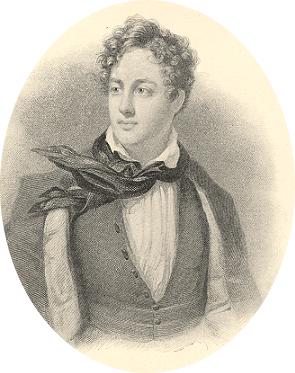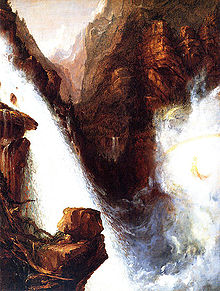|
|
Online Texts for Craig White's Literature Courses Illustrations for Henry James's Daisy Miller Byron's Manfred (1817) Act 3, Scene 4 recalls the ruins of the Roman Colosseum |
|
| I do remember me, that in my youth, | 10 |
| When I was wandering,—upon such a night | |
| I stood within the Coliseum’s wall | |
| Midst the chief relics of almighty Rome. | |
| The trees which grew along the broken arches | |
| Waved dark in the blue midnight, and the stars | 15 |
| Shone through the rents of ruin; from afar | |
| The watch-dog bay’d beyond the Tiber; and | |
| More near from out the Cæsars’ palace came | |
| The owl’s long cry, and, interruptedly, | |
| Of distant sentinels the fitful song | 20 |
| Begun and died upon the gentle wind. | |
| Some cypresses beyond the time—worn breach | |
| Appear’d to skirt the horizon, yet they stood | |
| Within a bowshot. Where the Cæsars dwelt, | |
| And dwell the tuneless birds of night, amidst | 25 |
| A grove which springs through levell’d battlements | |
| And twines its roots with the imperial hearths, | |
| Ivy usurps the laurel’s place of growth;— | |
| But the gladiators’ bloody Circus stands, | |
| A noble wreck in ruinous perfection! | 30 |
| While Caesar’s chambers and the Augustan halls | |
| Grovel on earth in indistinct decay. | |
| And thou didst shine, thou rolling moon, upon | |
| All this, and cast a wide and tender light, | |
| Which soften’d down the hoar austerity | 35 |
| Of rugged desolation, and fill’d up, | |
| As ’twere anew, the gaps of centuries; | |
| Leaving that beautiful which still was so, | |
| And making that which was not, till the place | |
| Became religion, and the heart ran o’er | 40 |
| With silent worship of the great of old,— | |
| The dead, but sceptred sovereigns, who still rule | |
| Our spirits from their urns.— | |
| ’Twas such a night! |
|
George Gordon, Lord Byron (1788-1824) quintessential Romantic poet |
Thomas Cole, Scene from Manfred 1833 |
![]()
![]()



